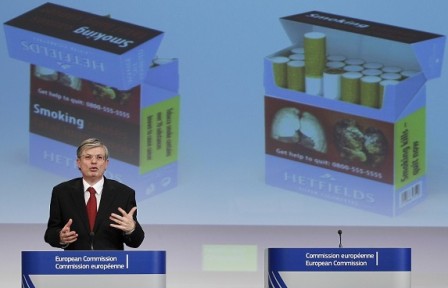British-based e-cigarette manufacturer Totally Wicked has today won the right to formally challenge the EU Tobacco Products Directive (TPD) at the Court of Justice of the EU (CJEU) in Luxembourg. Lawyers for the company this morning presented their case to Mr Justice Green at the Royal Courts of Justice in London.
Justice Green decided that a “preliminary ruling” reference should be made to the CJEU, to determine whether Article 20 of the TPD breaches EU law. It is expected that a hearing will take place at the CJEU in 2015.
In doing so, Totally Wicked has the first electronic cigarette manufacturer to win the right to challenge the Directive, which will bring e-cigarettes and e-liquid within its regulatory scope as a “tobacco related product” – despite not containing tobacco – and subject e-cigarettes to more stringent regulation than some conventional tobacco products.
The Directive, due to come into force in 2016, contains draconian news rules for the products, including that member states must be notified of all products coming onto the market at least six months before they are released, and that the notification must include all ingredients, a toxicology report, a description of components, nicotine dosing information, a description of the production process, and a guarantee that the manufacturer take personal responsibility for the safety of the product.
All e-cigarettes and refills will have to carry a warning that nicotine is addictive, and possible side effects will have to be included in an information leaflet; advertising won’t be allowed on TV or radio; and vast amounts of data on the industry and on possible negative effects of the products will have to be recorded and stored.
Totally Wicked’s challenge is based on its view that Article 20 of the TPD represents a disproportionate impediment to the free movement of goods and the free provision of services, places electronic cigarettes at an unjustified competitive disadvantage to tobacco products, fails to comply with the general EU principle of equality, and breaches the fundamental rights of electronic cigarette manufacturers.
Fraser Cropper, the Managing Director of Totally Wicked said “Today marks an important step in our legal challenge. Article 20 of the TPD would result in electronic cigarettes being subjected to a stricter regulatory regime than some tobacco products. Not only is this article therefore disproportionate, we believe it is also contrary to established EU law. It is therefore vitally important that the UK court has decided that the CJEU should make a ruling on the lawfulness of Article 20.
“It is vital that our industry is allowed to mature within a proportionate regulatory framework, which supports appropriate controls and safety requirements, and necessary social responsibility and continues to provide consumer choice,” he added.
Susan Garrett, the Partner leading the team at Addleshaw Goddard LLP mounting the challenge said “Totally Wicked believes that the Tobacco Products Directive is a misconceived and disproportionate attempt to regulate electronic cigarettes. Today’s decision is a key milestone for our client, given the impact it believes the Directive will have in stifling this emerging market.
“We are pleased to be supporting Totally Wicked in pursuing this landmark challenge to the lawfulness of the Directive, and are delighted that our client will now have the opportunity to argue its case in Luxembourg during the preliminary reference proceedings.”
The legal action was given the go-ahead by Jeremy Hunt, the Secretary of State for Health. Hunt is known to want a crack down on e-cigarettes, even going so far as to write to Members of the European Parliament to ask them to reclassify e-cigarettes as pharmaceuticals – a move opposed by his Conservative colleagues in the Parliament, along with Ukip and Liberal Democrat MEPs.
A source told Breitbart London that he had allowed the court action to proceed as he wants the validity of the Article 20 proved in court.

COMMENTS
Please let us know if you're having issues with commenting.